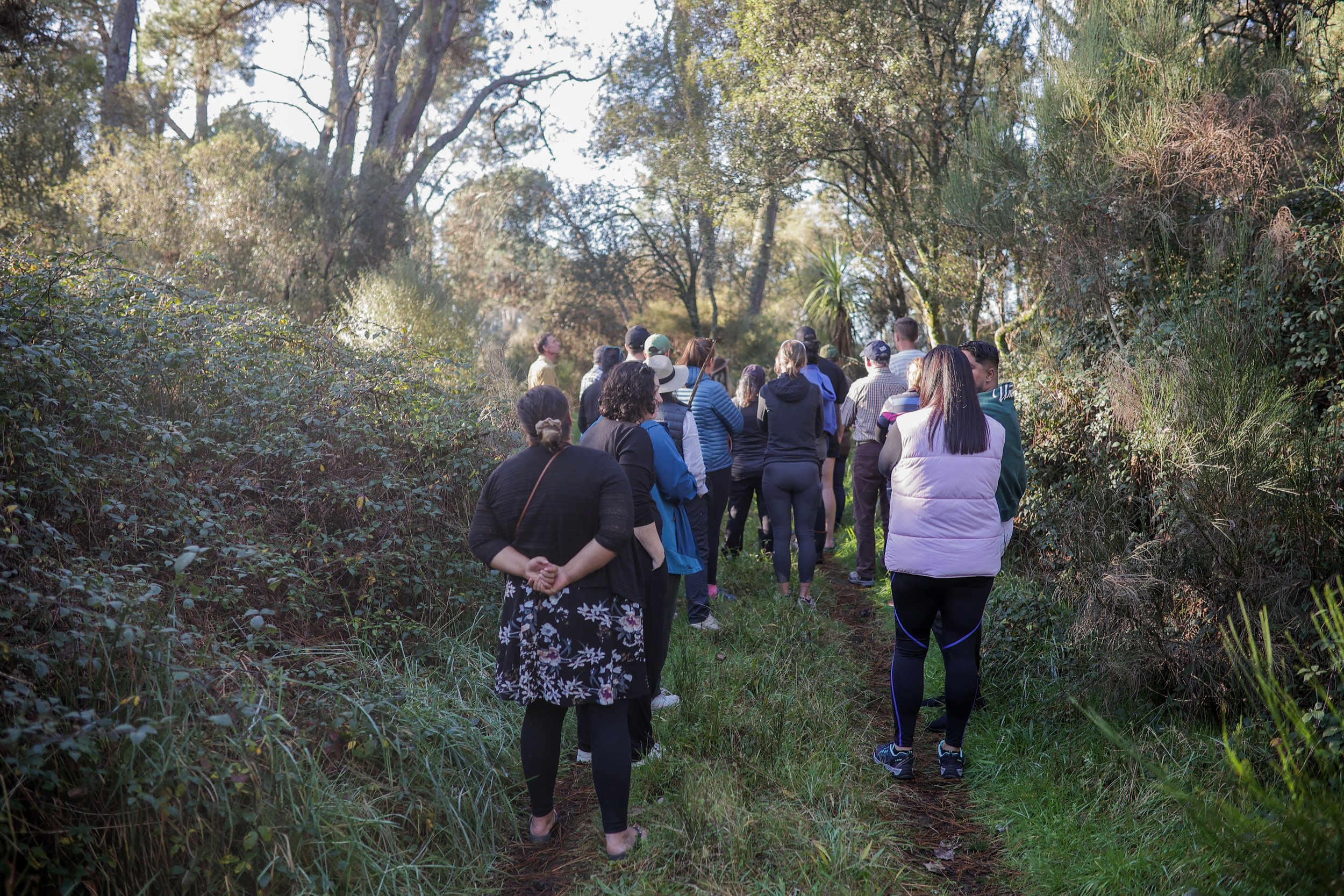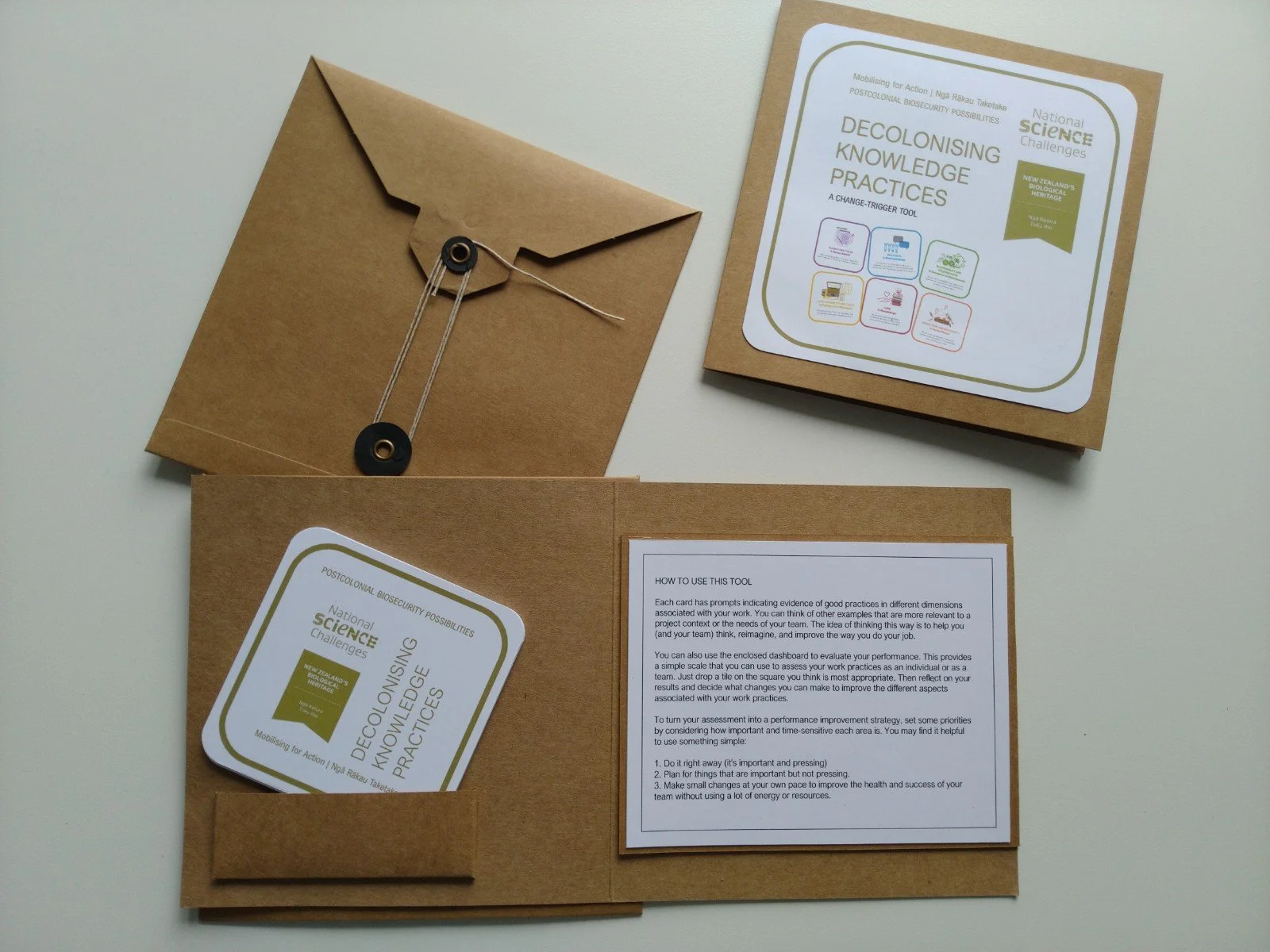
Our Research | Postcolonial Biosecurity Possibilities
Decolonising Biosecurity
Ohaki Pa: E oho! Wānanga, May 2023. Photo Struan Purdie Earlybird Media
Page Quicklinks
Key Research Aims
By ‘mapping’ values and by using a variety of methods and tools, this research will assist decision makers at a variety of scales and sites to incorporate shared and relational values into decisions.
Funded Years: 2020/21 2021/22 2022/23
Postcolonial Biosecurity Possibilities
This project was an offering by non-Māori social science researchers in support of kaupapa Māori research and the vision of decolonising biosecurity.
Ohaki Marae: E oho Wānanga, May 2023.
Photo: Struan Purdie Earlybird Media
Research Brief
The team explored what emerged when they mapped the relationality of kauri dieback and myrtle rust. They discovered care-full science approaches and more specifically practices supporting decolonisation.
Care-full Science
Kauri, pōhutukawa, mānuka and rata are familiar and iconic trees in Aotearoa New Zealand suffering from diseases. Through interviews and literature reviews this research began by tracing the development of science addressing these tree diseases. Systemic societal issues surrounding tree care were expressed and we learnt that the voices raising alarm about kauri health took time to be heard. There were also challenges of investing in research for native tree protection, including institutionally siloed information and exclusion of Māori knowledge.
Te ao Māori perspectives in the biosecurity system have become more visible, including the rationale for place-based data sovereignty. Opportunities for building trust in and respect for indigenous values now directly impact care for iconic trees. This StoryMap draws from the interviews to show that working with diverse values of tree care helps reconnect people with nature, as part of a complex diverse community of life.
To view the “Decolonising Knowledge Practices” card set use the arrows to scroll
The Decolonising Knowledge Practices card set combine with a Self-Assessment and Strategy Planning Board to form a Decolonising Knowledge Practices toolkit. Download a copy of the Decolonising Knowledge Practices card set and the Self-Assessment and Strategy Planning Board using the button links and follow the “How To Use This Tool” guidance below.
HOW TO USE THIS TOOL
Each card has prompts of good practice in different dimensions associated with your work. You can think of other examples that are more relevant to the context of your project or the needs of your team. The intent here is to help you assess your current practices and prompt you (and your team) to reimagine and improve the way you do your work.
You can also use the enclosed dashboard to evaluate your performance. This provides a simple scale that you can use to assess your individual practices and/or team efforts. Just place a tile on the square that you think better defines how well are you doing in each dimension. Then reflect on your results and decide what changes you can make to upgrade different aspects associated with your work practices.
To turn your assessment into a performance improvement strategy, set some priorities considering how important and time-sensitive each area is. You may find it useful to use a simple method such as:
1. Start by addressing the things that are important and urgent.
2. Plan for things that are important but not urgent.
3. To improve your team's performance and wellbeing, make small changes at your own pace, without committing a lot of energy or resources.
Click HERE to request by email a printed hardcopy of the complete Decolonising Knowledge Practices Toolkit. Please provide a mailing address for delivery.
Research Enquiry
A workshop in May 2021 in Christchurch brought the team together to find opportunities for mapping the science and policy caring for iconic trees. Here’s how the team began mapping and thinking about relationality…
And here’s what the work led to…
International Collaboration
This research included an international collaboration between researchers from Aotearoa New Zealand, Forest Research in the United Kingdom and Cardiff University in Crymu Wales which has led to project resources also being developed for a Welsh audience.
E oho Wānanga, May 2023.
Photo: Struan Purdie Earlybird Media
Project Outputs
Data Sets
Data Set: Relational Values of Kauri
Te Au The Current - We Should Protect Kauri.
Te Papa's Nature debate public response.
Data Set: Relational Values of Myrtaceae
Te Au The Current - To protect myrtles.
Te Papa's Nature debate public response.
Resources
How to Decolonise Knowledge Practices poster
Dare to dream of better research practices for biodiversity protection.
Decolonising Knowledge Practices cards set
Use with the Self-Assessment and Strategy Planning Board as a tool to encourage and support inclusive, equitable and regenerative biosecurity practices.
Self-Assessment and Strategy Planning Board
For use with the Decolonising Knowledge Practices card set.
Dad-Drefedigaethu Arferion Gwybodaeth
Welsh translation of Decolonising Knowledge Practices card set. Use with the Welsh Self-Assessment and Strategy Planning Board as a tool to encourage and support inclusive, equitable and regenerative biosecurity practices.
Bwrdd Hunanasesu a Chynllunio Strategaeth
Welsh translation of Decolonising Knowledge Practices Self-Assessment and Strategy Planning Board.
Wānanga
E Oho! Awakening Aotearoa and Mobilising Change: Noho Marae Wānanga at Ohaki Pā
Wednesday 24th May 2023 to Ohaki Pā and E Oho! Awakening Aotearoa and Mobilising Change. This noho wānanga was an opportunity to share experiences, tools, concerns, and ideas about holistic, Tiriti-centric, governance and management for our taiao and communities. Over two days 65 attendees immersed themselves in the ngahere and awa, to test some tools and technologies.
Story Maps
Care-full Science: Caring for Iconic Trees
Kauri, pōhutukawa, mānuka and rata are some of the familiar and iconic trees facing diseases that could wipe them out in Aotearoa New Zealand. We trace the development of underpinning science and some of the systemic issues surrounding our abilities to mobilise, share and value diverse knowledge to support tree care.
Care-full Social Science: Caring for Iconic Trees in Aotearoa and Wales
Caring for trees, particularly iconic trees, requires us to take care of how we do our science. We need to address injustices of the past and existing power relationships. We need to connect with ecosystems and the people who rely on them.
Gwyddoniaeth ofalus yng Nghymru
Care-full Science in Wales: Caring for treescapes with both Welsh and English text
Masters Thesis
Kauri Dieback Prevention: Relational Values of Knowledge Producers
Researchers and knowledge producers play a key role in kauri dieback knowledge production. Whilst their scientific discoveries are well documented in literature, their personal experiences and stories of working on kauri dieback are not. Yet these experiences and stories give key insights into the factors that shape kauri dieback knowledge production, and provide an understanding of how the current kauri dieback research landscape is operating.
Papers
MacBride-Stewart, S., O’Brien, L., Grant, A., Ayala, M., Finlay-Smits, S., Allen, W., and Greenaway, A. (2023). Healing Fragmentation of Forest Biosecurity Networks: A Conceptual and Reflexive Mapping Analysis of Postcolonial Relations that Matter in Aotearoa/New Zealand and Cymru/Wales. Knowledge Cultures, 11(1), 205–233. https://doi.org/10.22381/kc111202311
Ehler, K.S., Addison, C., Grant, A. and Finlay-Smits, S., 2023. Neoliberal Knowledge Production in Aotearoa New Zealand: Confronting Kauri Dieback and Myrtle Rust. Knowledge Cultures, 11(1). https://doi.org/10.22381/kc111202314
Greenaway, A., MacBride-Stewart, S., Grant, A., Finlay-Smits, S., Ayala, M., Allen, W., O’Brien, L., and Martin, M. (2023). Positioning Research to Improve Tree-Biosecurity Relations. Knowledge Cultures, 11(1), 234–259. https://doi.org/10.22381/kc111202312
Submitted Journal Paper
Finlay-Smits, S., Ayala, M., Allen, W., Grant, A., Greenaway, A. MacBride-Stewart, S., O’Brien, L., and Ehler, K.S. (in press). Decolonising Knowledge Practices: Developing a Self-assessment Tool that Encourages and Supports Inclusive, Equitable and Regenerative Practices in Biosecurity.
Presentations
Presentation by Dr Sara Mac-Bride-Stewart, School of Social Sciences, Cardiff University
PhD symposium, Amgueddfa Cymru / Wales, 29 June 2023.
Panel discussion at 4th International Congress on Biological Invasions – Ōtautahi Christchurch, 1-4 May 2023. Susanna Finlay-Smits chaired this panel and Will Allen led a discussion around developing a biosecurity system tool that encourages and supports inclusive, equitable and regenerative practices.
The New Zealand Biosecurity Institute Conference
Dr Andrea Grant presented in the plenary session on “Postcolonial Biosecurity Possibilities” in the annual National Education and Training Seminar at NETS2022: Changing Landscapes
Western Australian Biodiversity Science Institute
Webinar Presentation: Guiding indicators for co-producing knowledge through enduring partnerships
Report
Mobilising for Action Report
Co-Generating Systems of Care for Trees (Kauri and Myrtaceae)
A report for the Mobilising for Action theme Postcolonial Biosecurity Possibilities project.
Provocations
We collaborated with Te Papa to investigate two ‘provocations’ at the museum to seek public responses.
The provocation about Kauri Dieback asked:
We should protect kauri, even if that means we’ll never get to walk in the kauri forest again.
How do you feel about this idea?
The provocation about Myrtle Rust asked:
To protect myrtles like pōhutukawa in their natural setting, we should not plant any myrtles in our gardens.
How do you feel about this idea?
Blogs and Newsletters
New Zealand’s Biological Heritage Newsletter
Wānanga rejuvenates with 'care-full' science
Mobilising for Action Blog Post
How we, as social researchers, can support the growth of equity in knowledge making – Part 1
Mobilising for Action Blog Post
How we, as social researchers, can support the growth of equity in knowledge making – Part 2
Mobilising for Action Blog Post
How can non-Māori talk about postcoloniality?
New Zealand’s Biological Heritage Blog Post
Provoking possibilities for stronger relationships with nature
























